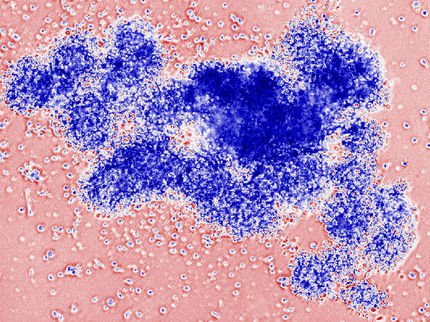Common cause for complications after kidney transplantation identified
The BK polyomavirus often causes complications after kidney transplantation. The research group of Professor Hans H. Hirsch from the Department of Biomedicine at the University of Basel has now been able to show, that the immunosuppressive drug Tacrolimus directly activates the replication of the virus and could thus be responsible for these complications.
Polyomavirus infections are common, however, they usually do not cause symptoms in healthy adults. However, the virus becomes much more problematic for patients who have to take immunosuppressive drugs after kidney transplantation. In ten to twenty percent of all cases, the BK virus starts to spread within the transplant and causes an inflammation. This can, in the worst case, destroy the new organ entirely and put the patient back on the transplant waiting list.
When it comes to organ transplantation, doctors mainly fight the human immune system, which tries to reject the donor organ. Immunosuppressive drugs, such as the commonly used Tacrolimus, are prescribed to suppress this process. The substance inhibits signaling between the body's immune cells. However, this treatment also weakens the immune system in such a way that it is no longer able to protect the organism sufficiently from viruses such as said BK virus – a predicament.
Drugs affect virus differently
The Transplantation & Clinical Virology research group from the Department of Biomedicine at the University of Basel led by Professor Hans H. Hirsch was now able to show, that the BK virus reacts completely different to various immunosuppressive drugs: While the commonly used drug Tacrolimus activates the replication of the virus inside kidney cells, the substance Sirolimus, a mTOR inhibitor, inhibits virus replication.
The results explain why in the past ten years an increasing number of cases of BK polyomavirus complications have occurred after the widespread introduction of Tacrolimus in transplantation clinics. The findings also provide important rationales for clinical trials in order to test the use of mTOR inhibitors like Sirolimus in patients in acute danger of loosing their kidney transplant without simultaneously having to increase the risk of organ rejection.
Original publication
H. H. Hirsch, K. Yakhontova, M. Li and J. Manzetti; "BK Polyomavirus Replication in Renal Tubular Epithelial Cells Is Inhibited by Sirolimus, but Activated by Tacrolimus Through a Pathway Involving FKBP-12"; American Journal of Transplantation; 2015
Most read news
Original publication
H. H. Hirsch, K. Yakhontova, M. Li and J. Manzetti; "BK Polyomavirus Replication in Renal Tubular Epithelial Cells Is Inhibited by Sirolimus, but Activated by Tacrolimus Through a Pathway Involving FKBP-12"; American Journal of Transplantation; 2015
Organizations
Other news from the department science

Get the life science industry in your inbox
By submitting this form you agree that LUMITOS AG will send you the newsletter(s) selected above by email. Your data will not be passed on to third parties. Your data will be stored and processed in accordance with our data protection regulations. LUMITOS may contact you by email for the purpose of advertising or market and opinion surveys. You can revoke your consent at any time without giving reasons to LUMITOS AG, Ernst-Augustin-Str. 2, 12489 Berlin, Germany or by e-mail at revoke@lumitos.com with effect for the future. In addition, each email contains a link to unsubscribe from the corresponding newsletter.





















































